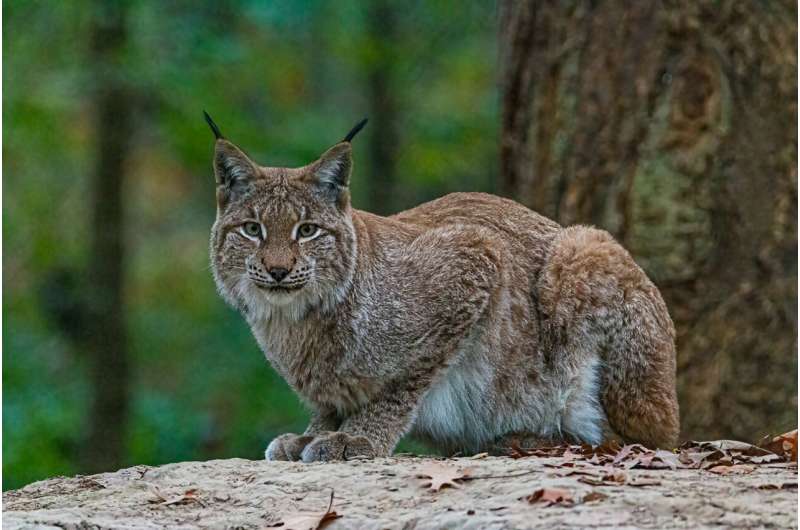How lynx and wolf reintroductions to Britain could be shaped by preconceptions and psychology

were recently and illegally released into in two separate incidents. The news prompted searchers to comb the Cairngorms region, the UK's biggest national park. People were warned not to approach the animals if they encountered them.
The astonishing recovery of lynx, wolf and bear populations over the last three decades is forcing us to confront our innate responses to animals like these once more. Now, with the idea of large carnivore reintroductions to Britain gathering pace, we are having to consider our potential relationship with them here.
Alongside unrelated and legal lynx reintroduction proposals in and , is there a chance that our assumptions about these animals might move quickly from fiction to fact?
As a conservationist of large carnivores, I investigate how apex predators can share landscapes . But I'm not afraid to admit that, as a small child, I had a terrible fear of one large carnivore in particular: the wolves in Disney's Beauty and the Beast. My fear might have had something to do with the place I first watched and read fairytales like that. I lived in a rambling Edwardian house on the edge of a small Irish town, with dark rooms and eerie corridors. But it was also linked to something much more profound: science.
We may mock stories like these for their crude caricatures of wolves and other predatory species. But, in my new book, , I argue that our evolutionary past, when our ancestors shared the plains of Africa with lions, hyenas and the like, conditioned us to react to .
While researchers can only speculate about some of the nuances of these ancient relationships, I suggest fairytales, particularly those embedded in European cultures, . Distilled through human history, these are age-old stories that reflect age-old fears that the big bad wolf really is bad.
Especially when carnivores like lynx return through human-led reintroductions, it is psychology, much more than ecology, politics, economics and philosophy, that may shape the likelihood and success of these proposals.
These other factors are important too. The environmental case for the reintroduction of apex predators is strong. They could help to , although it is unlikely to follow Yellowstone national park's simplistic narrative that and that wolves alone were responsible for its ecological restoration. Wolves keep elk populations at a healthy level, so plants are no longer overgrazed and this leads to taller, woodier plants, so beavers can thrive and rivers are restored.
But, the political case for reintroductions is weak. They are likely to drive bruising political conflict, especially over real and perceived impacts on rural communities, as witnessed recently in Europe with the political furore over the downgrading of the .
The economic and philosophical cases are both mixed. There is significant potential for in Britain. Though how the revenues from this possible bonanza could be shared with farmers losing livestock to these animals remains an open question. Similarly, a philosophical case can be made for , but doing so may lead to significant social conflict between farmers and conservationists. This could damage the overall cause of nature conservation, as I witnessed elsewhere in Switzerland and the Netherlands on my extensive travels to research my book.
The power of perception
But with ecology, politics, economics and philosophy, we all perceive and interpret the information about each of these subjects differently. We also do this in groups, whether social or political, online or offline. Here, other peoples' shared beliefs can , whether we are for or against the reintroduction of lynx and wolves, or—like myself—are somewhere in between. The presence of these animals needs to be considered not only in terms of the landscapes around us but also in terms of our relationships with the natural world, individually and collectively.
For these animals are not only the biological beings of our evolutionary past to which we respond intuitively, but also the psychological totems of our cultural milieu to which we respond symbolically. So their potential return to Britain is complex. Whether it will be more "," less the big bad wolf of Little Red Riding Hood infamy, or a bit of both, remains to be seen.
I thought I'd gotten over my childhood trauma from Beauty and the Beast. Yet, watching TV with my youngest child recently, we happened across the same scene that frightened me as a child. I felt a sudden rush of fear reach across the decades. It was only momentary, but I was surprised at its presence and its power.
Stories like these are age-old tales that reflect age-old fears about large carnivores. The evolutionary instincts and cultural memory that fairytales reflect are alive and well in the 21st century. As last week's probable rogue rewilding attempts and subsequent captures highlighted, lynx and wolf reintroductions may be shaped more by our personal and shared psychology than anything else. For this reason, learning to share landscapes with apex predators in Britain again will also be about learning to share landscapes with our complex and conflicting perspectives on these species of science and story.
Provided by The Conversation
This article is republished from under a Creative Commons license. Read the .![]()




















